More awareness and greater ease in donation procedures provide a glimmer of hope to renal failure patients in the city
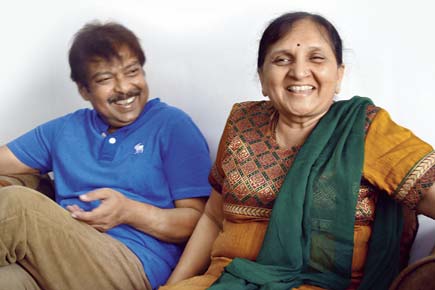
Having had a kidney transplant on April 10, 2002 in a few days, Ashok Shah (71) will complete 13 years of living on a ‘new’ kidney. The Andheri resident says, “The decision to get a kidney transplant done was the best one I made.
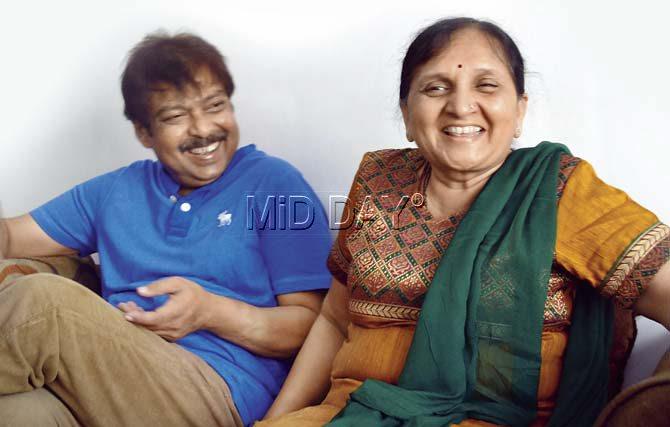
Rajesh Khetani (l) received a kidney from his wife Rekha in September, last year. Pic/Datta Kumbhar
ADVERTISEMENT
I was unable to get one from my family members as there was no match. So, I needed a cadaver (a corpse in medical literary and legal usage intended for dissection) transplant. I was on dialysis for almost 3.5 years prior to the transplant.”
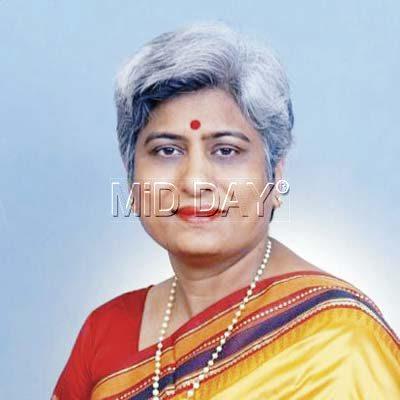
Dr Jyotsna Zope
New life
Much like Shah, Rajesh Khetani (49) who had a kidney transplant in September last year celebrates his ‘new’ birthday on the day he got new life. The Ghatkopar resident says, “September 30 will always be a special for me.
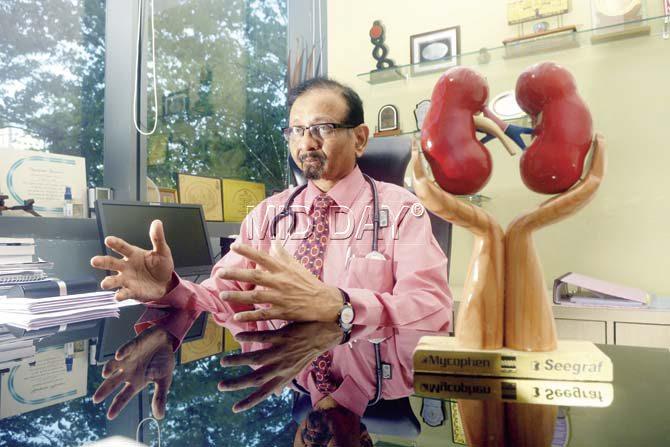
Dr Bharat Shah, Head of Renal Sciences at Global Hospitals, Mumbai explains the technicality related to kidney failure. Pics/Pradeep Dhivar
My wife Rekha did the most loving thing any spouse can do for, she gave me her kidney. They say when you get married you become one, now we have truly become that post the transplant.”
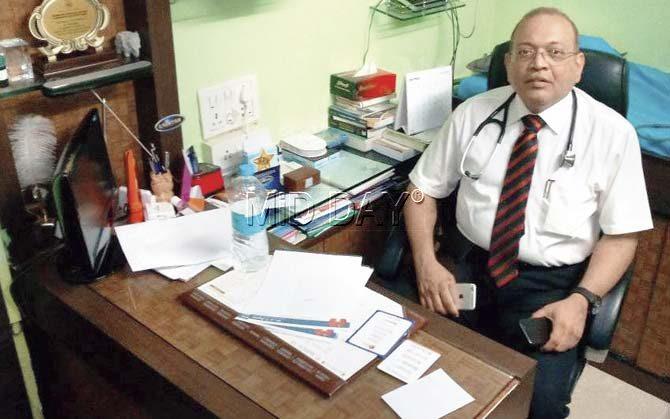
Dr Atul Ingle
Khetani was on dialysis for two months. He says, “I did not like the dialysis process, I felt I was not leading a quality life. When my wife suggested that she donate her kidney to me after we attended a workshop at Global Hospitals about renal disorders, I was relieved.”
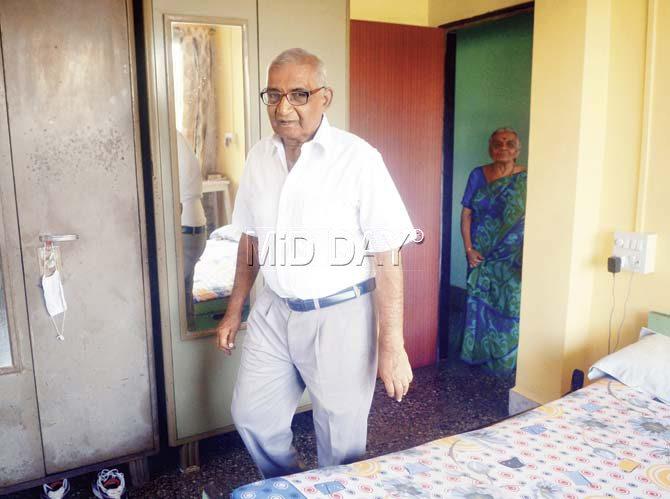
Ashok Shah has been leading a normal life, 13 years after his kidney transplant
Rekha, his wife proved to be the perfect match and the paper work for the kidney transplant procedure was done in two weeks. Khetani says, “I now feel perfectly fit ‘n’ fine. I drive to office everyday, go for long walks daily as well as ensure that I go on long treks on weekends.
My fitness has improved a lot. Recently, I drove non-stop for eight hours at a stretch on a road trip to Gujarat and I felt no tiredness at all.”
Happy to help
Also, 49, Rekha Khetani who donated her kidney to husband Rajesh says, “I am leading a normal life. The decision to donate my kidney came from within, when I saw my husband in so much pain every time he had a dialysis.
I feel physically great and when I see Rajesh today, I am happy that I have helped him get better and feel healthier.” Kharghar resident, Shobha Mhatre has also donated her kidney to husband Narendra.
The 60-year-old says, “My husband was on dialysis for three years. We were waiting for a cadaver donor when the doctor suggested we test our relatives for a match which would be better and faster. When the tests were done, I matched and agreed to give my husband a kidney.
The legal proceedings took a month. On January 13 this year, the operation was done.” Mhatre’s father-in-law had only one functional kidney which they found out when he was 75.
She says, “It was only when my father-in-law had a urine problem that we did a sonography and found out that he had only one kidney that was functioning all through his life. He went on to live till 85 with not many health issues. When I made the decision to donate my kidney, my father-in-law was my inspiration.”
Some changes
Since the operation, Mhatre has seen a huge improvement in her husband. She says, “Before the operation my husband had lost a lot of weight because of dialysis.
Now he has become healthy, his blood pressure and diabetes are also under control. I avoid making spicy food and red meat. On the other hand, I have been advised to avoid carrying heavy weights.”
Rajesh and Rekha Khetani eat healthier now. Rajesh says, “Post the transplant, I have managed to get back into life’s groove. I avoid salt, sugar and paneer. I also walk for 15 kilometres every day to stay healthy.
I have also told a friend’s wife who is suffering from renal failure to go for a transplant which she will be having in the next fortnight. My success story has inspired many which is a great thing.”
Rekha adds, “The best decision I have made is opting to donate my kidney. I am more conscious about exercise which I think is a good thing. I lead a normal life, I eat my favourite food in moderation.
As a donor, I want to allay people’s fears and educate them that donating a kidney doesn’t make you a lesser person. You can have the joy of seeing someone else healthy because of your decision, like I do everyday.”
Doctors speak
Dr Bharat Shah, Head, Institute of Renal Sciences, Global Hospitals, Mumbai says, “I have seen a great increase in renal failure in young people. The trend is that people are developing diabetes and high blood pressure in their 20s and 30s which leads to renal failure by the time they are in their 40s.”
Explaining the various types of kidney transplants available, Dr Jyotsna Zope, senior mephrologist at SL Raheja Hospital says, “The basic kidney transplants in India are live donor or cadaver donor.
Dialysis is a lifelong struggle which causes social disturbance, time loss as well as financial problems to patients as well as to their families. Cadaver transplants have a long line with waiting between 3 to 10 years; the best type of transplant is a live donor with higher success rates.”
As medical science is making huge strides now there are various solutions to blood group incompatibility. Dr Atul Ingle, nephrologist says, “There is swap treatment available, where the donors are shared by a group of patients and we do all transplants simultaneously.
Then, there is an option of performing a transplant irrespective of blood group. It is a little more expensive but it can be done. To be a donor, one has to be healthy that is not have diabetes or blood pressure problems. Any healthy individual can donate a kidney and save a life.”
Organ donation
“The three months of 2015 have so far seen, 15 cadaver donations in Mumbai, which is a huge plus. In 2014, we had only 45 donations for that full year. These help renal failure patients awaiting a kidney.
Tamil Nadu has a great model where the government helps families of brain dead persons donate the dead person's organs. In Maharashtra, the process is too complex,” explains Dr Shah. He goes on to add, “Only certified hospitals can take out organs from cadavers in the city.
So, if a person is brain dead in a non-certified hospital, the family may not want the inconvenience of the organ removal process and this puts them off from donation. I have appealed to the state government to make the process easier.”
Dr Zope says, “Organ donation awareness is picking up and this is a good sign for people suffering from kidney failure. The government has become more proactive, but there is still a lot that they need to do and can do. The sensitisation plan isn’t in place properly.
Like we have for blood donation, awareness about the urgent need for organ donation is vital in India.” Echoing the sentiments, Dr Ingle says, “Live related donors are most suitable when it comes to kidney transplant as the body accepts the organ more easily, due to shared DNA and genes.
When it comes to cadaver donation, we tend to give the patient a lot of medication which helps the body accept the new part.” Dr Shah also runs the Narmada Kidney Foundation which works to create awareness about kidney disorders.
The NGO workers visit residential societies, corporate offices, schools and colleges to screen people at risk for kidney disease and guide them. Healthier lifestyles and ease of donating, work in tandem to give patients a new lease of life.
With dialysis affecting the quality of life, more people are looking to kidney transplants as an option. The availability of kidneys and the number of patients in need is skewed. As organ donation awareness increases there is hope.
 Subscribe today by clicking the link and stay updated with the latest news!" Click here!
Subscribe today by clicking the link and stay updated with the latest news!" Click here!







